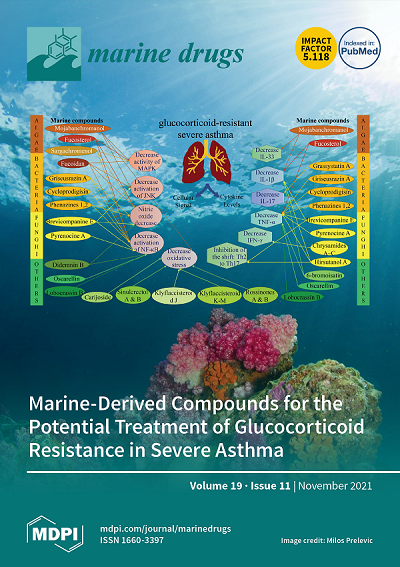壳聚糖/刺五加乙醇提取物纳米制剂对环磷酰胺诱导的卵巢毒性的改善作用:PPAR-γ/Nrf-2/HO-1 和 NF-kB/TNF-α 信号通路的作用
IF 4.9
2区 医学
Q1 CHEMISTRY, MEDICINAL
引用次数: 0
摘要
环磷酰胺(CP)是一种会导致不孕症的抗癌药物。本研究旨在评估壳聚糖纳米制剂与板蓝根螺旋藻乙醇提取物对环磷酰胺诱导的卵巢毒性的保护作用。九组雌性 Wistar 大鼠随机分配如下:第 7、8 和 9 组分别接受与第 3、4 和 5 组相同的处理,并注射单剂量 CP(200 mg/kg,I.P)。结果显示,CP 处理降低了雌二醇、孕酮、抗苗勒氏激素和 GSH 的含量,并下调了 PPAR-γ、Nrf-2 和 HO-1 基因的表达。此外,CP 处理还导致 FSH、LH 和 MDA 水平升高。同样,与对照组相比,CP 处理后 Caspase-3、NF-kB 和 TNF-α 蛋白表达上调,而 PPAR-γ 蛋白表达下调。经 SPNPs 处理的大鼠卵巢组织的氧化应激和炎症的有害影响大大降低。这项研究的结论表明,SPNPs 能抵消 CP 的影响,防止卵泡死亡,恢复促性腺激素激素平衡和正常的卵巢组织学外观。本文章由计算机程序翻译,如有差异,请以英文原文为准。
Ameliorative Effect of Chitosan/Spirulina platensis Ethanolic Extract Nanoformulation against Cyclophosphamide-Induced Ovarian Toxicity: Role of PPAR-γ/Nrf-2/HO-1 and NF-kB/TNF-α Signaling Pathways
Cyclophosphamide (CP) is an anticancer drug that causes infertility disorders. This study was designed to evaluate a nanoformulation of chitosan with an ethanolic extract from Spirulina platensis in terms of its protection against cyclophosphamide-induced ovarian toxicity. Nine groups of female Wistar rats were randomly assigned as follows: 1: control vehicle, 2: chitosan polymer, 3: telmisartan, 4: Spirulina platensis extract, 5: nanoformulation of the Spirulina platensis, and 6: single injection of CP; groups 7, 8, and 9 received the same treatments as those used in groups 3, 4, and 5, respectively, with a single dose of CP (200 mg/kg, I.P). The results displayed that the CP treatment decreased estradiol, progesterone, anti-mullerian hormone, and GSH content, and it downregulated PPAR-γ, Nrf-2, and HO-1 gene expression. In addition, the CP treatment caused an increase in the FSH, LH, and MDA levels. In the same manner, the protein expression of caspase-3, NF-kB, and TNF-α was upregulated in response to the CP treatment, while PPAR-γ was downregulated in comparison with the control. The rats treated with SPNPs exhibited a substantial reduction in the detrimental effects of oxidative stress and inflammation of the ovarian tissue. This study’s conclusions showed that SPNPs counteracted the effects of CP, preventing the death of ovarian follicles and restoring the gonadotropin hormone balance and normal ovarian histological appearance.
求助全文
通过发布文献求助,成功后即可免费获取论文全文。
去求助
来源期刊

Marine Drugs
医学-医药化学
CiteScore
9.60
自引率
14.80%
发文量
671
审稿时长
1 months
期刊介绍:
Marine Drugs (ISSN 1660-3397) publishes reviews, regular research papers and short notes on the research, development and production of drugs from the sea. Our aim is to encourage scientists to publish their experimental and theoretical research in as much detail as possible, particularly synthetic procedures and characterization information for bioactive compounds. There is no restriction on the length of the experimental section.
 求助内容:
求助内容: 应助结果提醒方式:
应助结果提醒方式:


